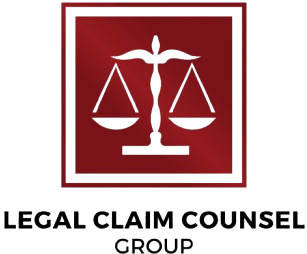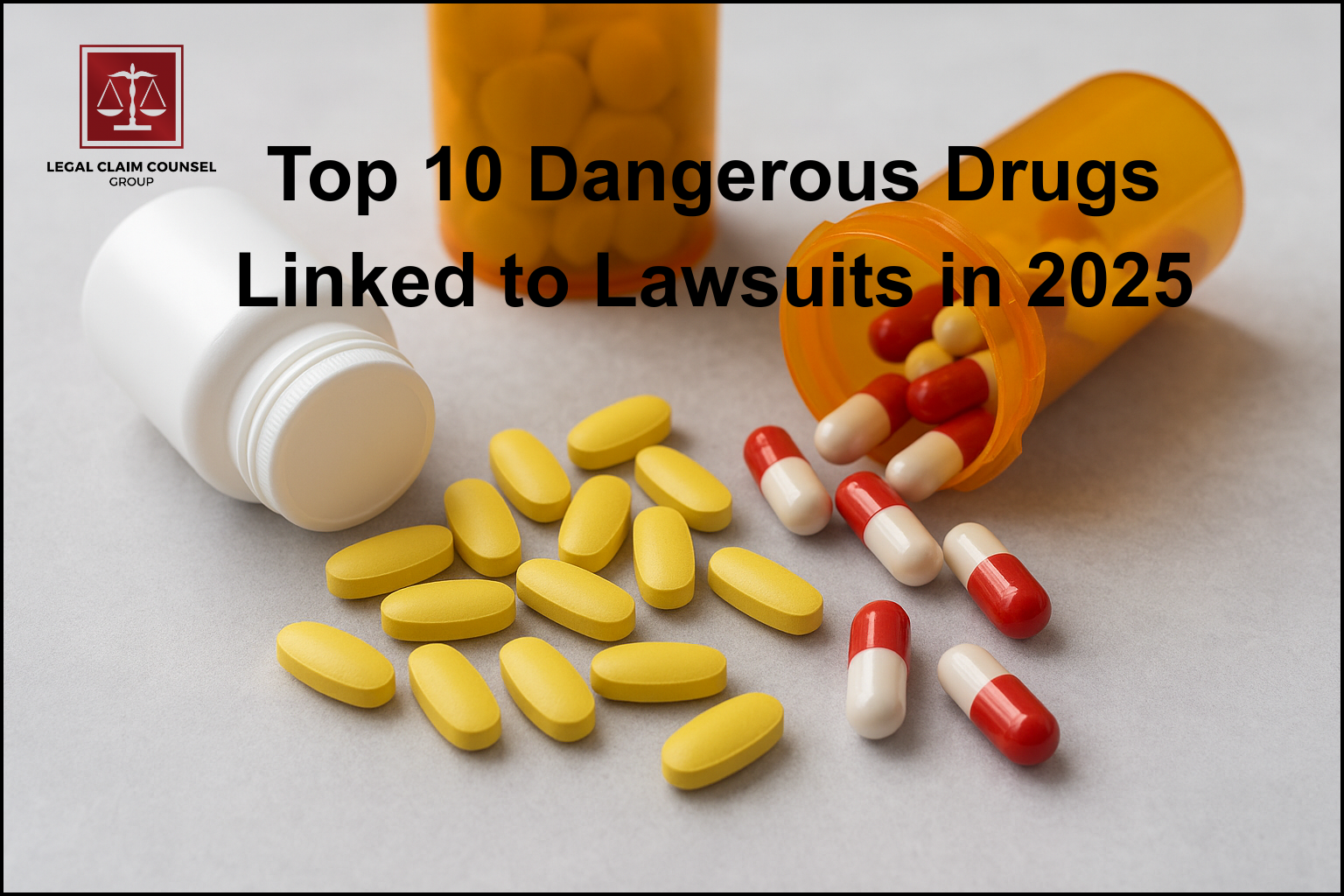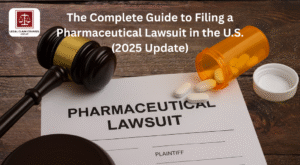Introduction
In 2025, the number of pharmaceutical drug lawsuits continues to rise across the United States. Many prescription medications, once believed to be safe, are now linked to severe health complications such as organ damage, cancer, and hormonal disorders.
Just like the ongoing Depo-Provera lawsuit, several other drugs have faced similar legal action due to their hidden risks and lack of transparency.
In this article, Legal Claim Counsel highlights the top 10 dangerous drugs linked to lawsuits in 2025, their major side effects, and how victims can take legal action to pursue justice.
1. Ozempic and Wegovy (Semaglutide)
Originally designed to manage Type 2 diabetes, Ozempic and Wegovy became extremely popular for weight loss. However, users have reported severe stomach paralysis (gastroparesis), intestinal blockage, and chronic vomiting.
Lawsuits allege that Novo Nordisk failed to properly warn users about these serious gastrointestinal risks.
- Main Allegation: Failure to warn and gastrointestinal injuries.
- Manufacturer: Novo Nordisk.
2. Depo-Provera (Medroxyprogesterone Acetate)
Depo-Provera, a hormonal birth control injection, has been associated with bone density loss, mood changes, weight gain, and brain tumors (meningioma).
Victims claim Pfizer knew of these long-term side effects but did not provide sufficient warnings. Read more about this topic in our full post:
What Are the Common Side Effects of Depo-Provera Shots
- Main Allegation: Failure to warn about risk of bone loss and tumors.
- Manufacturer: Pfizer.
3. Zantac (Ranitidine)
Zantac, once a leading heartburn medication, was recalled after being found contaminated with NDMA, a probable human carcinogen.
Thousands of lawsuits claim that long-term Zantac use caused bladder, stomach, and liver cancer.
- Main Allegation: Product contamination leading to cancer.
- Manufacturer: Sanofi, GSK.
4. Tylenol (Acetaminophen)
Recent research suggests that prenatal exposure to Tylenol may increase the risk of autism spectrum disorder (ASD) and ADHD in children.
Lawsuits allege that manufacturers and retailers failed to warn expectant mothers of these potential neurological risks.
- Main Allegation: Developmental disorders in children due to prenatal exposure.
- Manufacturer: Johnson & Johnson, major retailers.
5. Elmiron (Pentosan Polysulfate Sodium)
Elmiron, used to treat bladder pain syndrome, has been linked to irreversible eye damage and retinal toxicity.
Plaintiffs allege Janssen Pharmaceuticals did not disclose this serious risk.
- Main Allegation: Failure to warn about vision loss and eye disorders.
- Manufacturer: Janssen Pharmaceuticals.
6. Tepezza (Teprotumumab)
Used for thyroid eye disease, Tepezza is now associated with permanent hearing loss and tinnitus.
Victims are pursuing lawsuits against Horizon Therapeutics for failing to provide adequate safety warnings.
- Main Allegation: Hearing damage following treatment.
- Manufacturer: Horizon Therapeutics.
7. Gardasil (HPV Vaccine)
Gardasil, intended to prevent HPV-related cancers, has come under fire for causing autoimmune diseases, chronic pain, and neurological side effects.
Victims allege that Merck & Co. did not conduct sufficient long-term studies to ensure the vaccine’s safety.
- Main Allegation: Autoimmune and neurological side effects.
- Manufacturer: Merck & Co.
8. Valsartan (Blood Pressure Medication)
Contaminated batches of Valsartan were found to contain NDMA, a cancer-causing agent.
Victims who developed liver, kidney, or intestinal cancer after long-term use have filed lawsuits against multiple manufacturers.
- Main Allegation: Cancer risk due to NDMA contamination.
- Manufacturer: Hetero Labs, Teva, and others.
9. Suboxone (Buprenorphine/Naloxone)
While Suboxone helps treat opioid addiction, it has also been linked to tooth decay, gum damage, and tooth loss.
Victims claim that Indivior Inc. failed to warn users of severe dental risks associated with the medication.
- Main Allegation: Dental injuries due to product use.
- Manufacturer: Indivior Inc.
10. Hair Relaxers (Chemical Hair Straighteners)
Chemical hair relaxers often contain formaldehyde and other endocrine-disrupting chemicals. Research shows these products are linked to uterine, ovarian, and breast cancer.
Learn more about this issue in our detailed article:
Hair Relaxer Cancer Lawsuit: What Victims Need to Know
- Main Allegation: Increased risk of reproductive cancers.
- Manufacturers: L’Oréal, SoftSheen-Carson, and others.
Legal Options for Victims
If you or a loved one has experienced serious side effects from any of these drugs, you may be eligible to join a mass tort claim.
At Legal Claim Counsel, our experienced mass tort attorneys specialize in:
- Free case evaluations and eligibility screening
- Medical documentation review
- Filing claims in federal MDL or state courts
- Negotiating settlements and pursuing justice
We’ve also helped families affected by Baby Formula NEC lawsuits and other defective product cases across the U.S.
Conclusion
Pharmaceutical negligence can have devastating, long-term consequences. The lawsuits against these manufacturers aim to hold them accountable for failing to warn the public about serious health risks.
If you’ve suffered from a dangerous drug or medical product, our legal team is ready to help.
Contact Legal Claim Counsel today for a free case review and start your journey toward justice and compensation.
FAQs
1. What are the top drugs linked to lawsuits in 2025?
Depo-Provera, Ozempic, and Hair Relaxer products are among the most sued drugs this year.
2. Can I sue for drug side effects?
Yes. If you suffered severe side effects, you may qualify for a free case review with Legal Claim Counsel.
3. How does Legal Claim Counsel help victims?
We handle drug injury cases, investigate manufacturers, and fight for your compensation.



